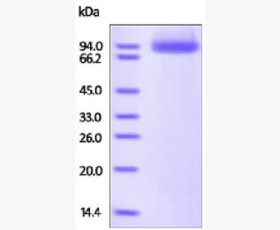Recombinant Human Transthyretin/TTR/PALB
| Product name: | Recombinant Human Transthyretin/TTR/PALB |
| Source: | Human Cells |
| Purity: | Greater than 95% as determined by reducing SDS-PAGE. |
| Buffer Formulation: | Lyophilized from a 0.2 μm filtered solution of 20mM TrisHCl, 150mM NaCl, pH 8.0. |
| Applications: | Applications:SDS-PAGE; WB; ELISA; IP. |
| Storage: | Avoid repeated freeze/thaw cycles. Store at 2-8 oC for one month. Aliquot and store at -80 oC for 12 months. |
| UOM: | 100ug/50ug/200ug/1mg/1g |
| Source | Human Cells |
| Description | Recombinant Human Transthyretin is produced by our Mammalian expression system and the target gene encoding Gly21-Glu147 is expressed with a 6His tag at the C-terminus. |
| Names | Transthyretin, ATTR, Prealbumin, TBPA, TTR, PALB |
| Accession # | P02766 |
| Formulation | Lyophilized from a 0.2 μm filtered solution of 20mM TrisHCl, 150mM NaCl, pH 8.0. |
| Shipping |
The product is shipped at ambient temperature. |
| Reconstitution |
Always centrifuge tubes before opening. Do not mix by vortex or pipetting. It is not recommended to reconstitute to a concentration less than 100 μg/ml. Dissolve the lyophilized protein in ddH2O. Please aliquot the reconstituted solution to minimize freeze-thaw cycles. |
| Storage |
Lyophilized protein should be stored at < -20°C, though stable at room temperature for 3 weeks. Reconstituted protein solution can be stored at 4-7°C for 2-7 days. Aliquots of reconstituted samples are stable at < -20°C for 3 months. |
| Purity |
Greater than 95% as determined by reducing SDS-PAGE. |
| Endotoxin | Less than 0.1 ng/µg (1 IEU/µg) as determined by LAL test. |
| Amino Acid Sequence |
GPTGTGESKCPLMVKVLDAVRGSPAINVAVHVFRKAADDTWEPFASGKTSESGELHGLTTEEEFV EGIYKVEIDTKSYWKALGISPFHEHAEVVFTANDSGPRRYTIAALLSPYSYSTTAVVTNPKEVDH HHHHH
|
| Background | Transthyretin is a secreted and cytoplasm protein which belongs to the Transthyretin family. Transthyretin is detected in serum and cerebrospinal fluid (at protein level). It is highly expressed in choroid plexus epithelial cells. It is also detected in retina pigment epithelium and liver. Each monomer of Transthyretin has two 4-stranded beta sheets and the shape of a prolate ellipsoid. Antiparallel beta-sheet interactions link monomers into dimers. A short loop from each monomer forms the main dimer-dimer interaction. These two pairs of loops separate the opposed, convex beta-sheets of the dimers to form an internal channel. Defects in Transthyretin are the cause of amyloidosis type 1 (AMYL1) which is a hereditary generalized amyloidosis due to transthyretin amyloid deposition. Protein fibrils can form in different tissues leading to amyloid polyneuropathies, amyloidotic cardiomyopathy, carpal tunnel syndrome, systemic senile amyloidosis. The disease includes leptomeningeal amyloidosis that is characterized by primary involvement of the central nervous system. |














